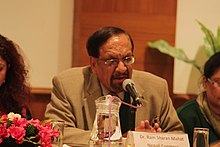Ram Saran Mahat
| Ram Saran Mahat | |
|---|---|
| राम शरण महत | |

Ram Sharan Mahat speaking in a program on women's participation
|
|
| Ministry of Finance | |
|
In office 25 February 2014 – 12 October 2015 |
|
| President | Ram Baran Yadav |
| Prime Minister | Sushil Koirala |
| Vice President | Paramananda Jha |
| Minister of Foreign Affairs | |
|
In office 1999–2000 |
|
| Personal details | |
| Born |
1 January 1951 Kabilas–8, Nuwakot |
| Nationality | Nepali |
| Political party | Nepali Congress |
| Parents |
|
| Alma mater |
Tribhuvan University, Kathmandu, Nepal Gokhale Institute of Economics and Politics, Pune, India |
| Awards |
Best Finance Minister Francis Humbert Humphrey Award for Leadership Role in the Public Service |
Tribhuvan University, Kathmandu, Nepal
Best Finance Minister
Ram Sharan Mahat was the Finance Minister of Nepal under the government led by Sushil Koirala.
He represented Nepali Congress in the Nepalese Constituent Assembly election, 2008 and was elected from Nuwakot-2 with 17,444 votes, defeating his closest opponent Hit Bahadur Tamang of Unified Communist Party of Nepal (Maoist).
He is widely acknowledged as one of the key architects of the economic reforms in the Post-1990 period which brought significant improvements in Nepal's economy with higher growth, progress in human development indicators and decline in poverty level. However, one of the controversial legacies of Mahat is the privatisation of public enterprises and state-owned industries at dirt cheap rates. His tenure also saw many reforms in the public expenditure management, finance and banking, and revenue reforms including the introduction of the Value Added Tax. He was the principal author of Nepal's Eighth Plan which brought about sweeping policy changes in the economy, with greater role to the private sector in economic activities.
During his time as finance minister, Nepal was elected chairman of the IMF/World Bank Board of Governors for 1998–1999. He also served as Minister of Foreign Affairs for about a year in 1999–2000.
He was dragged into controversy during earthquake in Nepal, 2015, when he and his secretary Ramesh Mahat were accused of selling zinc sheets meant for the victims and later thrashing the journalists who asked questions related to it in a press meet. He later resigned from the post of secretary which tarnished his credibility.
Mahat is credited for facilitating the reconstruction and rehabilitation works in the aftermath of the disastrous earthquake in Nepal in 2015—particularly holding a partially successful donors’ conference for reconstruction, and utilization of foreign aid in his district and for pushing for reforms to improve governance in the country’s Ministry of finance. For this work, he was declared as the world's best Finance Minister by The Banker magazine. In the eyes of the westerners, Mahat was a good finance minister because he adopted policies that were in the interest of donors. He was friendly towards the World Bank and the IMF.
...
Wikipedia
